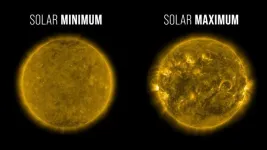(Press-News.org) Older adults in the UK who are socially isolated are more likely to have an insufficient intake of key micronutrients such as vitamin C and vitamin B6, increasing their risk of health problems, according to a new study led by UCL (University College London) researchers.
The study, published in the journal Age and Ageing, looked at data from 3,713 people in the UK aged 50 and over who filled in a detailed questionnaire about what they ate and drank on two separate days.
The researchers found that people who were more socially isolated were more likely to have a lower than recommended intake of five micronutrients that are essential for health: magnesium, potassium, vitamin C, folate and vitamin B6.
These micronutrients are typically found in small quantities in fruit, vegetables, legumes (such as peas, beans and lentils) and fish, suggesting a diet lacking in these food sources.
Lead author Professor Andrew Steptoe (UCL Behavioural Science & Health) said: “Our study shows that people who are more socially isolated are less likely to be getting enough micronutrients in their diet. This is important as inadequate intake of these micronutrients puts people at greater risk of health problems as they get older.
“One explanation for this link is that if you are more isolated, you might not have others around you to provide information about what is healthy and encourage a more varied diet. Older people also tend to stick to diets they know and might not vary their foods as much as they used to.”
Co-author Dr Camille Lassale from ISGlobal in Barcelona added: “A varied diet with enough plant-based food (fruit, vegetables, legumes, nuts and seeds, wholegrain cereals), and fish is important to help maintain a healthy body and mind. Access to these products needs to be guaranteed and promotion of their consumption is particularly important in the elderly who are living alone or isolated.”
For the study, researchers used data from the English Longitudinal Study of Ageing (ELSA), in which a nationally representative population sample in England answers a wide range of questions every two years.
The respondents were scored on how socially isolated they were, based on whether they lived alone, how frequently they saw friends and relatives outside their household, and whether they took part in any clubs or organisations.
The research team found that a one-point increase in participants’ social isolation score was linked to a higher likelihood of inadequate intake of five out of nine key micronutrients two years later. The intake of the nine micronutrients was estimated based on the information given in the dietary questionnaire.
The team adjusted for many factors that may have affected the results, including age, gender, education, marital status, food insecurity and impaired daily living, finding the link held true regardless of these.
Overall, the researchers found a striking number of respondents had vitamin and mineral intake that was lower than recommended. For instance, half of respondents had a low intake of potassium, a third had a low intake of magnesium, a quarter were not getting enough calcium and a sixth did not consume enough iron.
Magnesium and potassium are important for bone health, while a lack of the B vitamins folate and B6 are linked to a heightened risk of cardiovascular disease and cognitive decline. Vitamin C has multiple roles in aiding health, including maintaining healthy bones, cells and skin.
The researchers found that loneliness, unlike social isolation, was not linked to a lower intake of micronutrients. The researchers said this suggested that lower micronutrient intake was not related to the emotional aspect of isolation – how lonely a person feels – but to the practical consequences of having fewer connections, such as having fewer people around to give information about a healthy, varied diet, and no one to help them prepare nutritious meals. People with a high social isolation score may not necessarily feel lonely, the research team noted.
Social isolation was not linked to a higher likelihood of inadequate calcium, iron and vitamin B12, micronutrients largely derived from meat, eggs and dairy.
The researchers said this suggested that people who were less socially connected in the study may be more likely to have a more traditional diet with fewer vegetables (such as dark leafy greens), fruit, nuts, seeds and legumes.
The study involved researchers from UCL Behavioural Science & Health and the Barcelona Institute for Global Health (ISGlobal) and received funding from the National Institute on Aging in the USA and the National Institute for Health and Care Research in the UK.
END
Isolated older people more likely to have low levels of key nutrients in their diet
Older adults in the UK who are socially isolated are more likely to have an insufficient intake of key micronutrients such as vitamin C and vitamin B6, increasing their risk of health problems, according to a new study led by UCL researchers.
2024-10-15
ELSE PRESS RELEASES FROM THIS DATE:
Brazilian researchers work to transform agave into the ‘sugarcane of the sertão’
2024-10-15
Climate change has caused an increase in the semi-arid climate region in Brazil. Data from the National Center for Monitoring and Warning of Natural Disasters (CEMADEN) and the National Institute of Space Research (INPE) in the South American country indicate an expansion of 7,500 square kilometers per year since 1990, which is equivalent to five times the area of the city of São Paulo. A similar phenomenon has been observed in some regions of Europe and North Africa.
With this in mind, and with the desire to find solutions to mitigate climate change, a group ...
Seizures caused by children swallowing medications or illegal substances doubled over 15-year period
2024-10-15
Copenhagen, Denmark: New data shows that the number of children suffering a seizure after swallowing medications or illegal substances has doubled between 2009 and 2023 in the US. The findings were presented today (Wednesday) at the European Emergency Medicine Congress.
The most common substances involved in these poisonings include over-the-counter antihistamines, prescription antidepressants and painkillers, and illegal synthetic cannabinoids.
Dr Conner McDonald from the University of Virginia School of Medicine told the Congress: “Seizure is one of the most severe symptoms a poisoned ...
Increase in air pollution corresponds with more patients at the hospital emergency department
2024-10-15
Copenhagen, Denmark: Increases in levels of particulate matter in the air, even within World Health Organization guidelines, correspond with an increase in the number of patients going to the hospital emergency department, according to research presented at the European Emergency Medicine Congress today (Wednesday).
The study found links particularly between air pollution and cases of trauma, breathing difficulties and skin conditions.
The research was presented by Dr Andrea Rossetto an emergency medicine resident at University of Florence and Careggi University Hospital, Florence, Italy, and a PhD Student at Queen Mary University of London, UK.
Dr ...
NASA, NOAA: Sun reaches maximum phase in 11-year solar cycle
2024-10-15
In a teleconference with reporters on Tuesday, representatives from NASA, the National Oceanic and Atmospheric Administration (NOAA), and the international Solar Cycle Prediction Panel announced that the Sun has reached its solar maximum period, which could continue for the next year.
The solar cycle is a natural cycle the Sun goes through as it transitions between low and high magnetic activity. Roughly every 11 years, at the height of the solar cycle, the Sun’s magnetic poles flip — on Earth, that’d be like the ...
Scientists at ChristianaCare gene editing institute use CRISPR tools to safely disable gene mutation linked to treatment-resistant melanoma
2024-10-15
Scientists at ChristianaCare Gene Editing Institute Use CRISPR Tools to Safely Disable Gene Mutation Linked to Treatment-Resistant Melanoma
Study finds CRISPR restores the ability for cancer treatments to attack melanoma cancer cells with precision-guided gene edit that ignores healthy cells
Wilmington, DE, OCTOBER 15, 2024 -- In a potential advance for melanoma patients, researchers at ChristianaCare’s Gene Editing Institute have used CRISPR gene editing ...
Study busts myths about cause of gout
2024-10-15
A major international study has found gout is a chronic illness where genetics is a major cause, rather than lifestyle choices of the sufferer.
Led by University of Otago researchers, the genome-wide association study, published in Nature Genetics, analysed the genetic information of 2.6 million people.
Researchers analysed amalgamated DNA data sets from around the world. About three quarters of the data was from customers of 23andMe, Inc, a direct-to-consumer genetics and preventative health company, who consented to participate in research.
They found inherited genetics is an important part ...
Machine learning analysis sheds light on who benefits from protected bike lanes
2024-10-15
A new analysis from University of Toronto Engineering researchers leverages machine learning to help answer a thorny question: where should new protected bike lanes be placed to provide maximum benefit?
“Right now, some people have really good access to protected biking infrastructure: they can bike to work, to the grocery store or to entertainment venues,” says Madeleine Bonsma-Fisher, a postdoctoral fellow in the Department of Civil & Mineral Engineering and lead author of a new paper published in the Journal of Transport Geography.
“More ...
New research reveals how large-scale adoption of electric vehicles can improve air quality and human health
2024-10-15
A new study from the University of Toronto's Department of Civil & Mineral Engineering suggests that large-scale adoption of electric vehicles (EVs) could lead to significant population-level health benefits.
The research team used computer simulations to show that aggressive electrification of the U.S. vehicle fleet, coupled with an ambitious rollout of renewable electricity generation, could result in health benefits worth between US$84 billion and 188 billion by 2050.
Even scenarios with less aggressive grid decarbonization mostly predicted health benefits running into the tens of billions of dollars.
“When ...
Florida Inventors Hall of Fame invites nominations for 2025 inductees
2024-10-15
TAMPA, Fla. (Oct. 15, 2024) -- The Florida Inventors Hall of Fame is inviting nominations for the 2025 class of inductees. This award recognizes distinguished inventors with a connection to Florida, whose achievements have advanced quality of life for the state and the nation.
“Inductees to the Florida Inventors Hall of Fame represent some of our nation’s greatest inventors from across academia, industry and government,” said Paul Sanberg, chair of the Florida Inventors Hall of Fame Advisory Board and president of the National Academy of Inventors. “Their achievements underscore the critical role that innovation plays in driving ...
Election officials can boost voter trust in delayed results with early communication
2024-10-15
In recent U.S. elections, results often took days to finalize, fueling voter distrust in the electoral process and ballot outcomes. Now, research from the Yankelovich Center for Social Science Research at UC San Diego shows that a simple, proactive message from election officials – ahead of Election Night – can effectively reduce this distrust.
The study, published in PNAS Nexus, reveals that when voters are informed in advance that counting ballots accurately takes time and there are security measures in place, their trust in the process remains steady, even when results are delayed.
“Election officials ...
LAST 30 PRESS RELEASES:
COVID-19 vaccination during pregnancy may help prevent preeclampsia
Menopausal hormone therapy not linked to increased risk of death
Chronic shortage of family doctors in England, reveals BMJ analysis
Booster jabs reduce the risks of COVID-19 deaths, study finds
Screening increases survival rate for stage IV breast cancer by 60%
ACC announces inaugural fellow for the Thad and Gerry Waites Rural Cardiovascular Research Fellowship
University of Oklahoma researchers develop durable hybrid materials for faster radiation detection
Medicaid disenrollment spikes at age 19, study finds
Turning agricultural waste into advanced materials: Review highlights how torrefaction could power a sustainable carbon future
New study warns emerging pollutants in livestock and aquaculture waste may threaten ecosystems and public health
Integrated rice–aquatic farming systems may hold the key to smarter nitrogen use and lower agricultural emissions
Hope for global banana farming in genetic discovery
Mirror image pheromones help beetles swipe right
Prenatal lead exposure related to worse cognitive function in adults
Research alert: Understanding substance use across the full spectrum of sexual identity
Pekingese, Shih Tzu and Staffordshire Bull Terrier among twelve dog breeds at risk of serious breathing condition
Selected dog breeds with most breathing trouble identified in new study
Interplay of class and gender may influence social judgments differently between cultures
Pollen counts can be predicted by machine learning models using meteorological data with more than 80% accuracy even a week ahead, for both grass and birch tree pollen, which could be key in effective
Rewriting our understanding of early hominin dispersal to Eurasia
Rising simultaneous wildfire risk compromises international firefighting efforts
Honey bee "dance floors" can be accurately located with a new method, mapping where in the hive forager bees perform waggle dances to signal the location of pollen and nectar for their nestmates
Exercise and nutritional drinks can reduce the need for care in dementia
Michelson Medical Research Foundation awards $750,000 to rising immunology leaders
SfN announces Early Career Policy Ambassadors Class of 2026
Spiritual practices strongly associated with reduced risk for hazardous alcohol and drug use
Novel vaccine protects against C. diff disease and recurrence
An “electrical” circadian clock balances growth between shoots and roots
Largest study of rare skin cancer in Mexican patients shows its more complex than previously thought
Colonists dredged away Sydney’s natural oyster reefs. Now science knows how best to restore them.
[Press-News.org] Isolated older people more likely to have low levels of key nutrients in their dietOlder adults in the UK who are socially isolated are more likely to have an insufficient intake of key micronutrients such as vitamin C and vitamin B6, increasing their risk of health problems, according to a new study led by UCL researchers.


